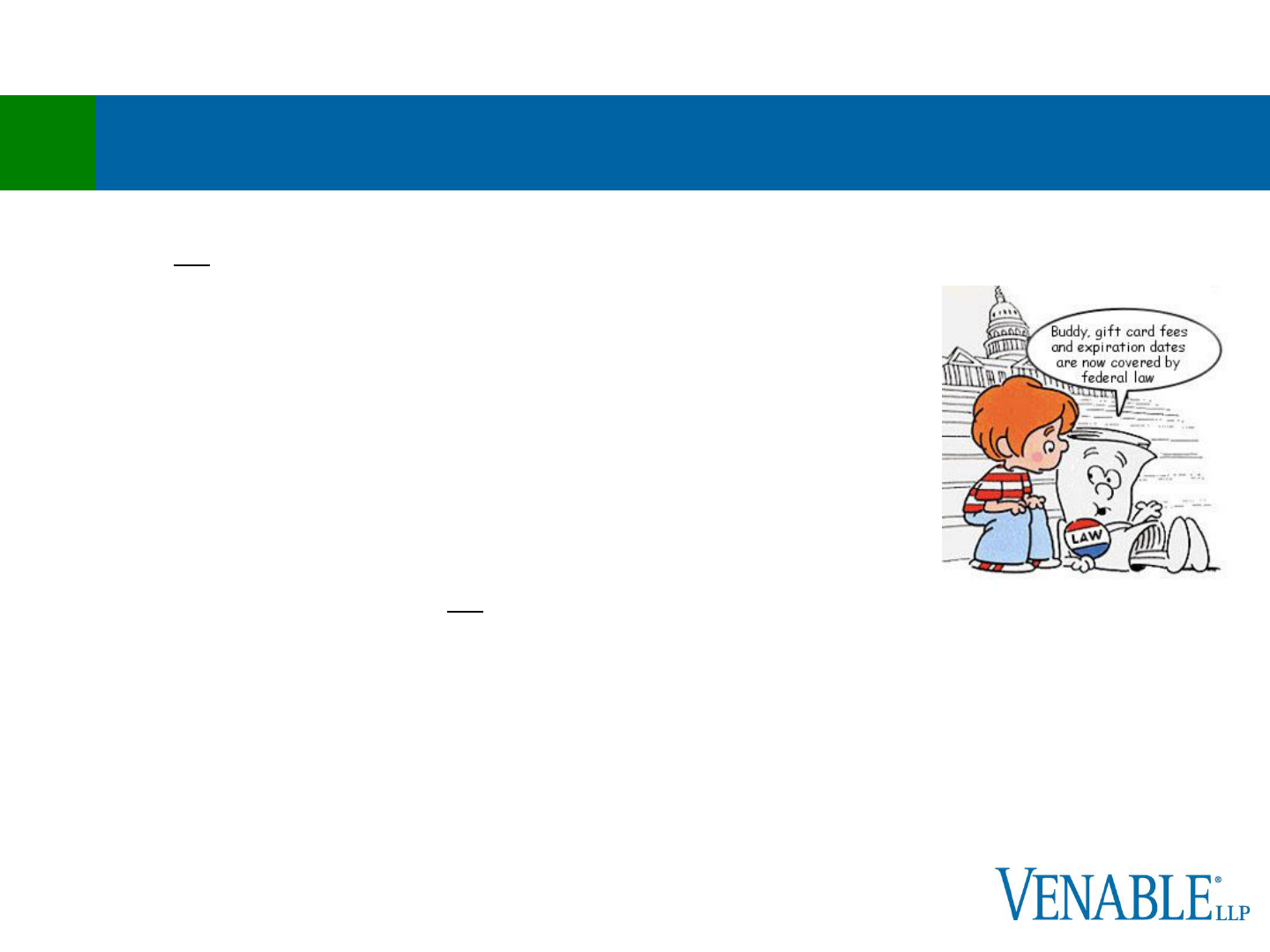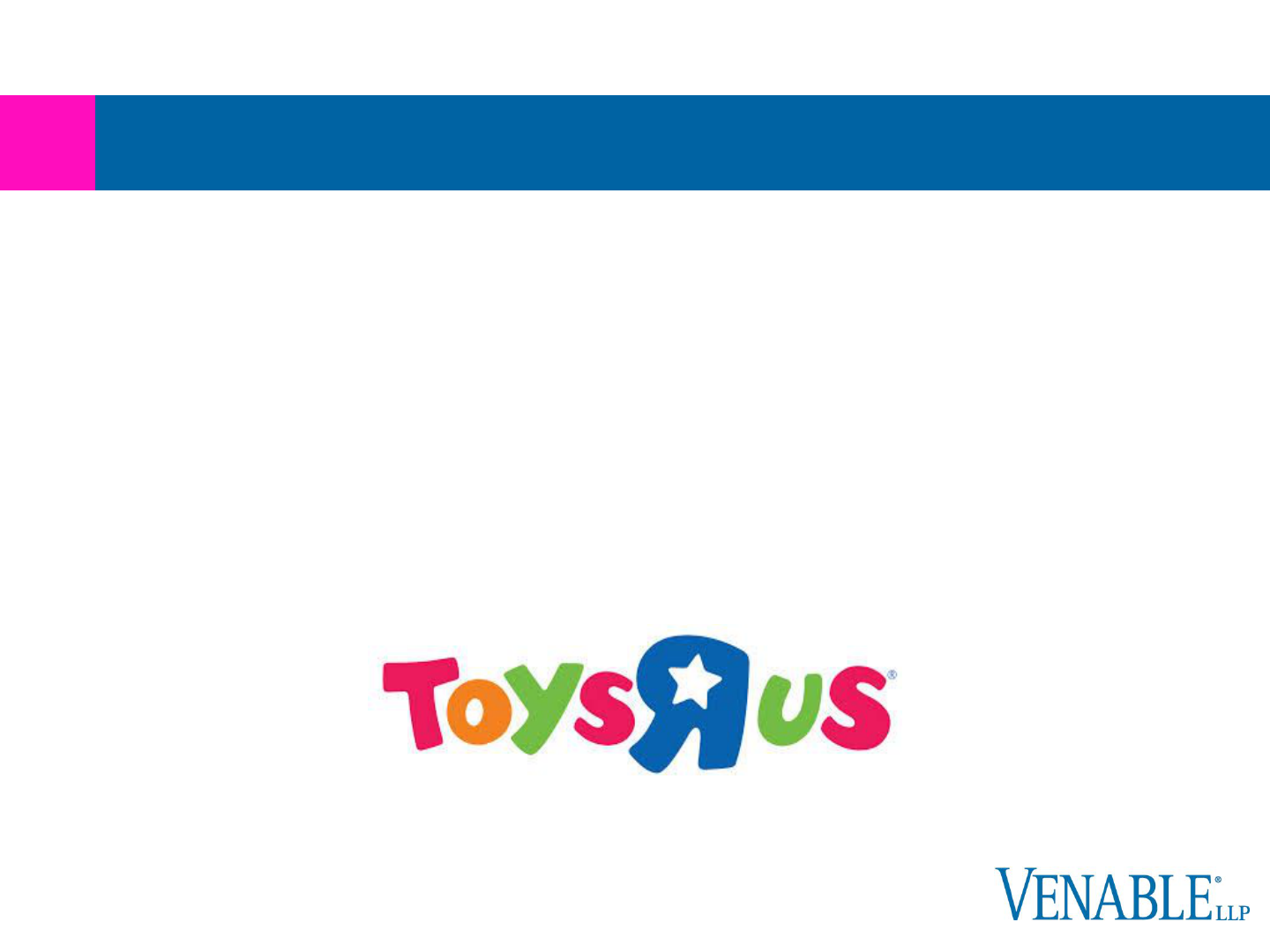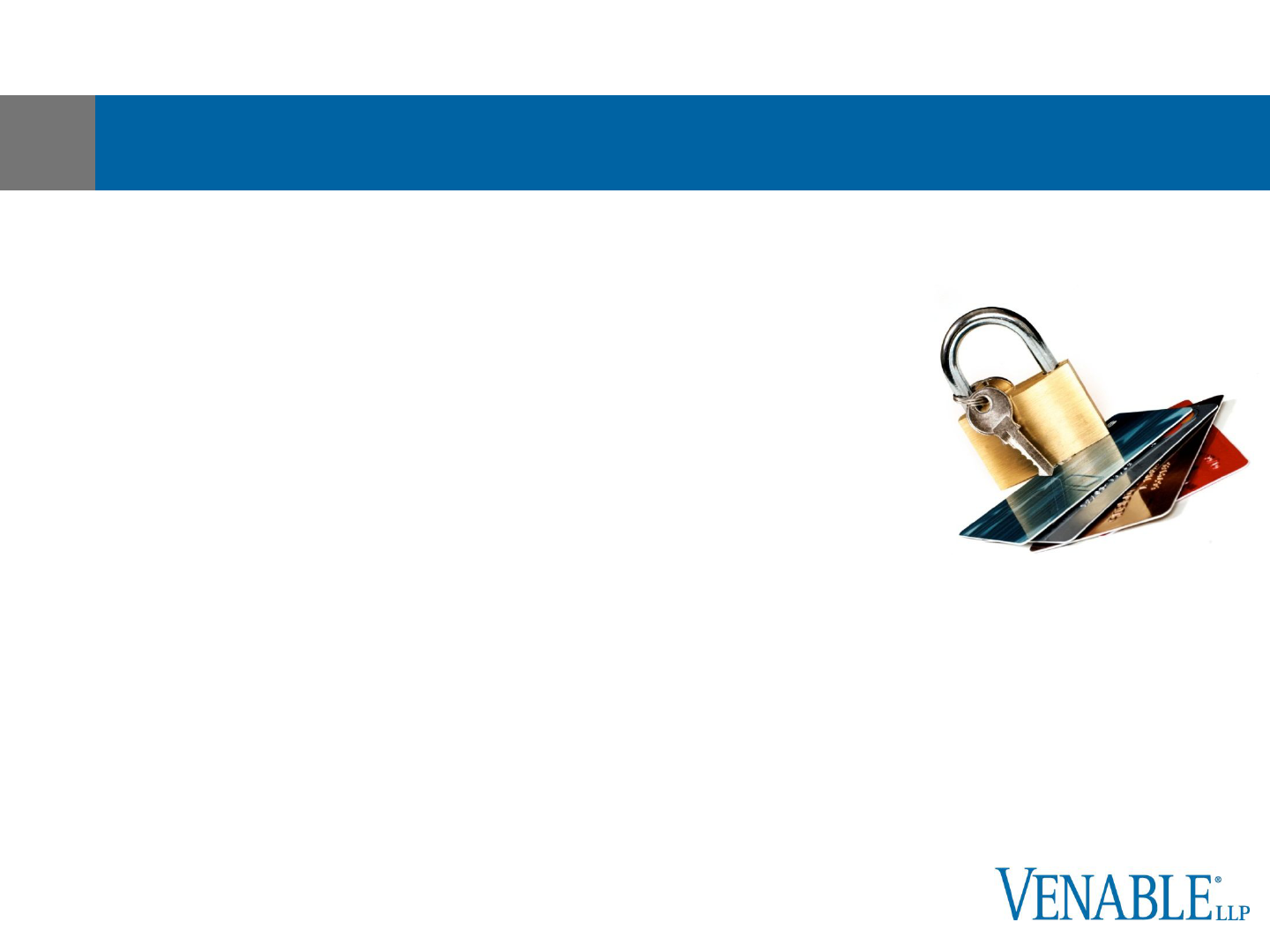
BRAND ACTIVATION ASSOCIATION ANNUAL LAW CONFERENCE
NOVEMBER 19, 2013
Moderator:
Melissa Landau Steinman, Esq., Venable LLP
Panelists:
Eric Anderson, Esq., Sears Corporation
Lindsey Burton, Esq., Western Union Corporation
Lisa Szalaji, Esq., Ahold Corporation
Gift Cards, Coupons and Loyalty
Programs: Today's Landscape,
Tomorrow's Rules
WASHINGTON, DC • MARYLAND • VIRGINIA • NEW YORK • CALIFORNIA • DELAWARE

Taxonomy
Federal & State Gift Card Laws: Consumer Protection
– Federal Laws: The CARD Act and the Consumer Financial Protection
Bureau (“CFPB”)
– State Gift Card Laws
– Recent Gift Card Litigation and Settlements
Coupons and Promotional Loyalty Promotions
Gift Cards as Unclaimed Property
Banking Laws
Privacy Laws
Intellectual Property Laws
Hypothetical
Agenda

Open Loop
Has network logo on it
(Visa/MC/AmEx/Discover)
Useable anywhere that accepts
network cards
Reloadable
Funds can be added again and
again after initial load
Might have an activation fee,
monthly maintenance fee, etc.
Closed Loop
Only accepted at a single retailer
Non-reloadable
Loaded once, funds spent
down until they are gone
Usually no additional fees
Gift Cards

Taxonomy—Gift Certificates, Cards, Coupons, Vouchers, Groupons,
Codes and Vouchers
• Features/functionality
– Payment Processor
– Issuer
– Channel – traditional card, mobile, internet
– Compliance controls
• Regulatory
– CFPB: UDAAP and Reg E
– FinCEN: Prepaid Access
– FTC: UDAP
– CARD Act
– Gramm-Leach-Bliley: Reg P (and other applicable privacy laws)
– Applicable state laws/ regs
Taxonomy --Considerations in Choosing a Card Type

Federal & State Gift Card Laws – Federal Laws
Credit Card Accountability Responsibility and Disclosure (CARD) Act
– Does not preempt state gift card laws -- floor, rather than a ceiling
– Applies broadly: GCs, stored value cards, general use prepaid cards
– Exclusions:
• Loyalty, award, or promotional gift cards;
• Cards used solely for telephone services;
• Reloadable cards not marketed/labeled as a GC;
• Cards not marketed to the general public;
• Paper certificates; or
• Cards redeemable only for admission to events/venues
– Expiration Dates: Card may not expire earlier than 5 years after date issued;
expiration date must be clearly and conspicuously stated
– Fees prohibited unless:
• No activity for 12 months;
• Required disclosures made;
• Only one fee charged per month; and
• Additional requirements determined by Fed Res. Bd are met

Consumer Financial Protection Bureau (CFPB):
• Independent agency with broad authority to issue regulations, supervise
depository and non-depository institutions, enforce consumer financial
protection laws, and prevent “unfair,” “deceptive,” and “abusive” acts and
practices (UDAAP)
Centralized authority to enforce the federal gift card requirements, but yet to actively
do so. Has started to look at GPR cards.
• 2012: CFPB examined whether Maine, Tennessee gift card laws were
preempted by federal provision stating must be honored for at least 5 years.
• Maine– Not preempted: State laws providing for 2 year abandonment period, no
expiration dates, process pursuant to which consumer may always go to issuer to
redeem cards (who then goes to state for reimbursement)
• Tennessee-- Preempted: State escheat provision providing GC expires earlier of
expiration date or 2 years from issuance acts as “effective expiration date” as
consumer must go to state to redeem
Federal & State Gift Card Laws –Federal Laws

Federal & State Gift Card Laws – State Laws
– Expiration Dates: Some states prohibit altogether (e.g., CT, ME, RI), but majority permit
w/ extra requirements:
– Permissible, but clear disclosure required (AZ, GA, NV)
– Permissible, but must be valid for a certain no. of years (KS [5], OH [2], ND [6])
– Permissible, but need clear disclosure AND time requirement (AR, HI, MD, MA)
– Dormancy and Service Fees: States may
• Prohibit fees (e.g., CO, CT, FL, HI),
• Permit but require clear disclosure (e.g., AZ, GA, SC, VA), or allow only under specific
circumstances or after certain time period (e.g., AR, CA, IA, ME)
– Specific disclosure requirements
• Most important: provisions requiring seller to provide “Cash-back” redemption
upon request, e.g., fully redeemable in cash (CA), or unused portions
redeemable in cash, usually $5 (CO, ME, MT, NJ)
• Date of issue (HI, MA)
• Toll-free numbers (CT, IL, MA, VA)
– Common Exemptions
• GCs issued under loyalty program (AZ, NH, NJ, NM, TX)
• GCs issued for multiple sellers (CA, ND, TN)
• GCs issued below face value for fundraising (HI, OK, WA)
Gift Card State Consumer Protection Laws

Federal & State Gift Card Laws –State Laws
– New Jersey: After lengthy litigation and much controversy, the petition for writ of certiorari in
NJRMA v. Sidamon-Eristoff denied by Supreme Court. SB 1928, which was enacted on June
29, 2012 and provided for:
• 5 year abandonment period
• Cash-back provision
• Prohibition of post-purchase fees and expiration dates
• Disclosure requirements
• Collection of ZIP codes from purchasers (stayed until July 29, 2016)
– Vermont: Amendment adds key provisions relating to loyalty, award and promotional
certificates and embraces a Groupon model treating promotional/ paid values differently
changes minimum expiration period from 3 to 5 years, adding an exemption for GCs donated
to charitable organizations
– Illinois: Definition of GC now includes a credit slip issued to consumer for returned goods.
– Rhode Island: 1-year expiration date for donated GCs
– Very active area: Nearly a dozen states proposed new legislation in 2013
New State Laws: Enacted

Recent Gift Card Litigation & Settlements
Groupon Settlement [In re Groupon Marketing and Sales Practices Litigation, U.S.
Dist. No. 11-md-02238 (S.D. Cal. Mar. 29, 2012)]
• 17 Lawsuits consolidated into MDL alleging expiration dates violated CARD Act prohibition of
expiration dates earlier than 5 yrs and failure to sufficiently disclose terms
• Settlement valued at $8.5 M
• Must clearly and conspicuously disclose:
1. Difference between promotional value expiration and purchase price expiration; and
2. Expiration date after which customers may not redeem portion of the voucher that is only
promotional value;
3. Exceptions: certain types of offers, e.g., travel, ticketed events
• Only 10% of future deals may have expiration date of <6 months
• Daily deal issues—hybrid of coupon and gift card

Recent Gift Card Litigation & Settlements
Law suit trend: Failure to comply with cash-back provisions
People v. Starbucks, Case No. 2009-166948 (Cal. Sup. Ct., 2009)
• County DAs’ Offices initiated an investigation based on company’s failure to honor CA’s law
requiring refund of GC balance on request when less than $10.00 remains
• Starbucks agreed to pay $225,000 in civil penalties, costs, and restitution, change signage
add button to cash registers/other POS, train employees on how and when to redeem GCs
People v. Rite Aid, Case No. 37-2012-00083218 (Cal. Super. Ct., 2012)
• Complaint alleged Rite Aid should have cashed GCs for customers whose balances fell
under $10.00. Plaintiffs asked Court to fine Rite Aid $2,500 per violation.
• Judge ordered Rite Aid to pay $800,000 for misleading customers about benefits of its
customer rewards program and gift cards; Rite Aid must clearly state when its +UP Rewards
and Wellness Card holders are entitled to receive coupons, disclose expiration dates or
limitations on rewards, train employees to properly cash GCs

Recent Gift Card Litigation & Settlements
More litigation on cash-back requirements: Cindy Maxwell, et al. v. Toys R
Us
• Plaintiffs alleged that Toys R Us violated CA cash-back requirement by selling gift
cards with misleading language about their cash value redemption – “Not redeemable
for cash, except as required” (back of card).
• Trial court ruled that Toys R Us was under no obligation to inform gift card holders of
their rights under CA law. Ruling has been appealed.
• Most of the cash-back provisions put the onus on the consumer to request a refund, but
this is a twist, particularly when read in conjunction with the reasoning in the Shelton
case (below).

Coupons often look similar to a gift card in terms of
applicable laws and regulations, but purely
promotional in nature.
• Percentage off or discount
• May apply only to services or merchandise
• Make sure terms and conditions are clear
Coupons & Promotional Loyalty Programs
Coupon Elements
1. Expiration Date
2. Per Purchase Limit
3. Item Restriction
4. Redemption Location
5. Trading Stamp Disclosures.

© 2012 Venable LLP
Rewards Programs
Loyalty programs:
• Have in place comprehensive terms and conditions – and
remember, the Ts and Cs are a contract
• Ensure that advertising for the rewards program is consistent
with the terms and conditions
• Disclose any material changes to the terms and conditions
and check (the rules) before you change
• Is notice required before terminating the program or parts of
the program? How much?
• Is the program so complicated it may be deceptive and
misleading? Walgreens investigation in Missouri
Coupons & Promotional Loyalty Programs

Coupons & Promotional Loyalty
Recent Litigation
Shelton v. Restaurant.com (2013) – NJ law requires all gift cards/certificates
to be valid at least 2 years. Each coupon stated “the certificate expires one
(1) year from the date of issue, except . . . where otherwise provided by law”
and “void to the extent prohibited by law.” NJ Supreme Court ruled that
online coupons are “written consumer contracts” subject to state law.
John Myers v. BJ’s Wholesale (2013) and Brian Farneth v. Wal-Mart
(2013)- Class actions in Pennsylvania state court accuses the defendants
of charging and collecting sales tax on the full price items when customers
use discount coupons. State regulations say businesses can’t apply sales
tax coupon discounts if the coupon and items purchased are listed on the
customer’s receipt.

Gift Cards as Unclaimed Property
• Escheat law provides that property may be presumed abandoned if there is
no activity with respect to the property for a specified period of time
• The abandoned property must be reported/turned over to the state
• Question of whether GCs should be escheatable when cannot be redeemed
for cash, only food, merchandise, etc.—some states exempt
• Penalties and interest for failure to escheat can be significant, yet some
companies have structured programs that rely on “breakage” or unredeemed
gift cards as part of financial model
Escheat Law Overview

Gift Cards as Unclaimed Property
– Gift cards that have been unused for a certain period of time must
be reported as abandoned property (AK (3 yrs), DE (5 yrs), ME (2 yrs))
– Exclusion of GCs from abandoned property laws (AZ, CT, MD, ND, UT)
– Legislation deleting references to “gift certificates” from the unclaimed
property provisions (KS, MA, SC, WI)
– Exemptions for specifically defined types of GCs.
• AL. Gift card presumed abandoned three years after June 30 of the year it was sold
unless it is issued or maintained by a person engaged primarily in the business of
selling tangible personal property at retail; if it is redeemable in merchandise only,
redeem at 60% of face value
• CO. Escheat laws apply to any gift card issued by a business that is redeemable in
cash, except that gift cards issued for food, products, goods or services are exempt
• FL. Gift cards exempt from reporting requirements of Florida's UPTA unless issued by
a financial institution or money transmitter and redeemable by multiple unaffiliated
merchants
– Connecting the unclaimed property issue to the expiration date/and or fee
issue (CA, IL, NC, PA)
Do Gift Cards Escheat? States split:

Gift Cards as Unclaimed Property
Where should you report unredeemed gift cards (and
should you report them at all)?
– Federal Common Law (Texas v. New Jersey, 379 U.S. 674 (1965);
Pennsylvania v. New York, 407 U.S. 206 (1972); and Delaware v. New York,
507 U.S. 490 (1993))
• 1
st
Priority – State of owner’s “last known address”
• 2
nd
Priority – State where Holder is incorporated
– UUPA and Transaction-Based Test
• 3
rd
Priority - State where the transaction occurred.
– NOTE: Third Circuit held in NJRMA v. Sidamon-Eristoff that the third
priority rule is unconstitutional and the US Supreme Court priority rules
apply.

Gift Cards as Unclaimed Property
– VERY COSTLY. Assess interest (and sometimes penalties) on
unreported or unpaid amounts.
• E.g., California imposes penalties of $100 per day up to $10,000 for willful failure to report
abandoned property and $5,000 to $50,000 for willful failure to deliver abandoned property to
the state, and assess 12% interest on undelivered abandoned property.
• Long Look-Back Periods (up to 20 years). DE goes back to 1981.
• Voluntary Disclosure Agreements (“VDA”) – Shorten look-back, but could increase risk (i.e.,
Staples settlement).
• More than 80% of states are using third-party auditors; contractors often work for contingency
fees (10% of property recovered)
– Settlements
• No [public ] settlements re: gift cards to date.
• Cost Examples
– Staples (Sept. 2012): $8.9 million (rebates)
– AIG (Oct. 2012): Multi-state settlement for estimated $300 million
– MetLife (Apr. 2012): $700 million
Penalties and Settlements

Banking Laws
– FinCEN Prepaid Access Final Rule (July 2011): Implements Bank Secrecy
Act (BSA) applicable to Money Services Businesses (MSBs) by expanding
parties subject to law to include providers and sellers of prepaid access. Rule
meant to curtail money laundering activities.
• MSBs subject to new registration, customer identification and verification,
reporting and recordkeeping obligations
• Required adoption and maintenance of AML programs
• Includes key exceptions for closed loop access programs with not to exceed
$2,000 max value associated with a card on any day, so long as the seller
has “implemented policies and procedures reasonably adapted to prevent”
the sale of over “$10,000 to any person during any one day.”
– OFAC Screening: Office of Foreign Assets Control (OFAC) prohibits any U.S.
person from conducting transactions with certain entities and persons listed on
specially designated and blocked persons list.
• Certain “financial institutions” issuing gift cards may have a duty to establish
and maintain customer identification information
• Not likely true for issuers of disposable, fixed denomination gift cards, cards
that are not reloadable and have no cash access.
Bank Secrecy Act/Anti-Money Laundering/OFAC

Privacy Laws
• The purchase of a GC may trigger collection of consumer PII
• Applicable privacy obligations may include:
1. Self-imposed restrictions, such as an internet privacy
policy;
2. Statutory obligations governing online data collection and
offline data practices; and/or
3. State data security breach notification laws
Developing Tensions in Privacy and Treatment of Gift Cards
• Escheat laws discouraging collection of customer information
• FinCEN and state money transmitter laws that require collection
of customer identification information
• California Song-Beverly Credit Card Act (“Song-Beverly Act”),
Cal. Civ. Code §§ 1747.00 et seq and similar laws prohibiting
collection of zip codes with credit card transactions
• New Jersey gift card law requiring collection of zip codes post-
2016
Privacy Overview

Intellectual Property
1. Like normal gift cards, but electronically delivered
2. May include patents
3. Other issues: disclosure of terms and conditions?
• Unique approaches for enabling customers to personalize eGift Cards with
messaging, text, and images.
• Software for processing and secure delivery of eGift Cards (e.g., mobile-
optimized eGift purchases)
USPTO granted issuance of Patent No. 8,442,866 to CashStar in June 2013.
CashStar powers a network of nearly 300 leading retailer and restaurant brands
(Best Buy, Pottery Barn, Sephora, etc.). Consumer demand for eGifts has
exploded, with 1
st
quarter sales more than double the same period in 2012.
The Virtual Gift Card (eGift Card)
Patents
Example

Intellectual Property
Alexsam v The Gap, Inc. – Plaintiff, a “patent troll,” sued The Gap for violating
two patents that cover systems and methods for putting money on to a store gift
card and activating it at POS. After six months of litigation, the infringement
claims were rejected by a jury. This decision follows a similar non-infringement
determination for Barnes & Noble.
Alexsam v. Pier 1 Imports– Texas Federal Circuit unanimously upheld a TX
federal jury’s verdict that Pier 1 Imports gift card system does not infringe on
two Alexsam patents.
Patent Litigation

“Thank Goodness for Gift Cards
Or
Melly’s Excellent Thanksgiving Shopping
Adventure”
Future Trends: Looking Forward
Hypothetical


Part 1.
• What did the ad say?
– “Free Gift” (vs. a sweepstakes)
– “Guaranteed Satisfaction”
• The “Card” itself
– What is it?
• Purchase vs. Promotional/loyalty coupons and the differences in how they
are regulated
• Gift cards vs. Groupons
– What does it say? Disclosures on coupons.
• Melly’s Mobile Coupon Experiences
– Problems with the “Amazing Pass”
– Smartphone coupons

Part 2.
Issues associated with collecting zip codes in the sale of gift cards
• The Song-Beverly Act and the Williams-Sonoma case
• NJ’s amendment to its gift card law to require collection of zip
codes (stayed until 2016)
• FinCEN rules
• Practical issues with paying for a gift card with a gift card
• Prohibitions/restrictions on the ability to expire gift cards; exceptions
for gift cards issued in conjunction with promotional or loyalty cards
where no consideration is paid
• What is consideration—what about nonmonetary? Is standing in
line consideration?

Part 3.
Rewards certificates and disclosures:
• Rewards certificate failed to disclose that it could not be redeemed
for gift certificate—does it need to when it was disclosed in the
rewards program terms and conditions?
• Regulation of rewards programs is more relaxed, but can a
certificate still be regulated as gift card? A promotional/loyalty
card? Is it paper certificate?
– Paper certificates are an exception under CARD Act, but not
state laws.
• Can you have disclosures for rewards program at tear pads at cash
registers/online?
• What are the font size requirements for terms and conditions
disclosures? Some state laws require10 point disclosures

Part 4.
Gift cards and coupons sent by text message
• How do you get express written consent to send a gift card or coupon by
text message to a customer? Rules got stricter in 10/2013
– “Prior express written consent” means consumer’s agreement – in
writing and signed, either on paper or as allowed electronically under
the E-SIGN Act – that clearly authorizes the seller to deliver calls or
messages using ATSD and states the number to which calls or
messages may be delivered.
– Written agreement must include a clear and conspicuous disclosure
that (a) consumer is authorizing calls to be delivered using ATSD, and
(b) the consumer is not required to provide consent as a condition of
purchasing any property, goods, or services
• How do you make disclosures for cards in text message when space
limited—FTC update of Dot.com Disclosures

Part 5.
Dormancy fees and expiration date s:
• Dormancy fees and expiration date prohibited or restricted under many
state laws, as is “expiration by dormancy fee”– and have been several class
actions involving these factual circumstances, e.g., charging dormancy fees
without properly disclosing until gift card was effectively expired. (Five Guys,
Shell Oil)
• CARD Act permits dormancy fees but restricts number and specifies how to
disclose.
• When card have escheated, some states permit companies to redeem card
and then go back to state to get money

Part 6.
Cash-back requirements:
• Several states have laws that require that companies provide cash refunds
to consumers requesting them
• Statutes requiring cash back(e.g., CA, CO, ME, MA, MN, NJ, OR, RI, VT,
WA) generally require redemption only upon request when balance is less
than $5 (sometimes $10)
• Starbucks case brought by DA in Napa, CA, more recent case brought
against Rite Aid, and several additional consumer class actions (Chipotle,
Toys R Us) have involved a failure by seller to make proper refunds. High
risk area receiving a lot of attention
• May require employee training—often employees are not aware of legal
requirement, and class action attorneys are playing “gotcha”

Part 7.
Other issues:
• E-gift cards
• Preventing fraud
• How to properly make disclosures
QUESTIONS???
